
I'm back from a meeting of the city's Civil Service Commission, the kind of night when we all regret not being paid by the hour. But it had its rewards. An intern who bore the long evening well happens to be the brother of an old grade school classmate. And I've earned the nickname "Mister Rules," a reference that, when approved by my lawyer colleagues, could be understood as both a compliment and a statement of fact.
If my mayor intended each of the three commissioners to play off one another ideologically, he's brilliant: I am the strict absolutist, treating rules as rules; on one side of me a interpretationalist and on the other, a deliberator. We're more fun than the Supreme Court, and just one-third layman.
"If only clothing companies realized the market killing they'd make by weaving polo shirts to old-style trims," many a young man has cried as he holds up a modern polo shirt in the department store, fingering over-large flares of the short-sleeve cuffs with a grimace. Or maybe just me? A small and vanishing part of my summer wardrobe is a contingent of polo shirts from my father's mothballed closet and Goodwill; nothing younger than twenty years and, consequently, nothing in better than fair condition. I discovered them in the retro heyday of the mid-1990s and have been enjoying them since. Here at my sister's house, I wore one yesterday and was chided for the "air-conditioning" available to my shirt's left armpit. But nobody notices if I don't raise my arms, I protested, to heartier laughter.
This morning's Washington Post has a powerful, thoughtful George Will column. It also has a half-page article in the Style section on, as the subtitle explains, "Old-School Polo Shirts." Brotherhood I have found:
The boys of summer are topping their cargo shorts and jeans with sporty polos. These aren't the loose, long variety rampant a few years back — they're snug and retro, with many by brands your dad oncewore. "Our shirts are rooted in 1950s and '60s suburbia," says Chris Kolbe, vice president of Original Penguin, a mid-century brand resurrected by Perry Ellis International in 2003. "We're taking the original styles popular with Bob Hope, Bing Crosby and Arnold Palmer and focusing on different colors, fits and fabrics to make them more relevant to twenty-something guys."
Cotton-polyster kept me happy, Mr. Kolbe. But since you're offering, I accept. A minute of mouse-clicking and my search is complete: Urban Outfitters stocks Original Penguin polos. My money will will be well-spent, operative word "spent."
Tonight I went to see the musical Carousel at the Cassidy Theater in the southern inner suburb of Parma, as part of a local Republican fundraiser. As far as Rogers & Hammerstein go, it's alright; I prefer Oklahoma! and won't even try to diminish the almighty the Sound of Music with a comparison. The players at the Cassidy were a community troupe and for non-professionals the performance was excellent; I didn't care much for the story, jagged and unbalanced with little character development.
As much as I may enjoy them, I admit to mentally checking off numbers from the program — to better gauge the drama, see? Tonight, however, the best was saved for second-last: when character Billy Bigelow watched his daughter from afar, the actress danced ballet, joined by a male partner. Both were adept and remarkably expressive as actors. Now, as an American male I can attest to being introduced to ballet through cartoons and comic displays; never having seen a live, serious performance, further pushed by that famous sequence in Top Secret!, my appreciation for the delicate dance art is somewhat stunted. Tonight was quite a revelation.
The cookies came out picture-perfect (just how they ended up as that is a little secret). My Republican organization's picnic was terrific: braving scattered thunderstorms our little group met, talked, dined and listened to a female barbershop quartet called Notability — let me tell you, you haven't seen stage presence and musicality until you're brought back to styles that are leaning on seventy-five years. Everyone enjoyed themselves, including the entertainment; the contralto "bass" even offered words of tribute to Ronald Reagan's legacy. Notability's songs were barely on the final note before our club was clapping and hollering, sending them off with a final, standing ovation. We all went home happy, a song in our heads and a few pounds of hot dog meat in our bellies. And very possibly two new members greater. If I drank, I'd be popping open a Miller right now.
A&W Root Beer will do. Evening!
I'm making a batch of chocolate chip cookies — the batter tastes like success, so my mother can congratulate herself for instilling one more domestic talent in her son. The treats are for the picnic my local Republican organization is holding tomorrow evening. It's no accident that I've taken time to bake: presiding over a meeting last week, I heard a board member grin that "bachelors always bring boxed goods from the supermarket." She's right, of course; so it's up to me to buck the trend.
The picnic is showing its own signs of success, which is nothing short of a blessing. My GOP club suffers from the same lack of volunteers as every city — part of it from the greying demographic, residents who are nevertheless absent from the community; part of it from the tail end of the uninvolved Me Generation, just now understanding how they misunderstood selfishness for freedom. According to RSVPs, attendance will be the best for a special event in years. Guests should include our state senator and representative; proxies for a local judicial candidate and our own United States Senator, George Voinovich; and the Bane of Dennis Kucinich, the honorable Ed Herman. Before we enjoy some ballads sung by local talent, we'll all dine on hot dogs, chips, picnic sides — and, of course, chocolate chip cookies.
First batch is ready to come out of the oven. Excuse me.
Have you ever taken half an hour out of your life to explore a place that's nearly been your backyard for decades, to discover the length and breadth and color of the place? Last August, when the Eastern United States' power outage forced me outside for a few hours, I explored a road traveled only a handful of times in a quarter century — and what a world unto itself it was.
Evenings this week, beginning tomorrow, are booked solid with work to do and places to be. Friday, my buddy Paul and I leave for yet another celebrated Albany Excursion. I intend to photo-document as much of the trip as I can, from start to finish, so that ought to be both a chore and a joy wrapped into one. So tonight, with a little free time, I topped off the tank, deposited my paycheck and turned down Coe Avenue.
Over twenty years ago — twenty years! — one of my sister's friends lived there. Heather Z., I believe. I have a distinct memory of driving down the suburban Coe in the passenger seat of my parents' emerald green 1970 Chevy Caprice, my mother driving; dropping my sister off at a house on the west side of the north-south street. It was evening, early summer. The sun was drawing lengthening shadows from the trees, yellow-orange flare peeking though their leaves. I remembered children, girls, playing; my sister joining them. And a hill.
It was dusk by the time I turned onto Coe and took it slowly south, looking west. No hill, nor a clear recollection. But I kept driving south out of curiosity — I don't think I'd driven down the street since that remembered day. I began to roam the adjacent streets, not certain to what Coe connected.
It's a fascinating sport, street-trolling. More practical than a pure timewaster, too: it's how short cuts are made. A high school clique of fellows two years older than I — an eccentric band of brothers, really — set out a good number of years ago to drive down every street in North Olmsted. Not as easy as it sounds, our city labryinthine for only 37,000. And most of the guys left after school for the corners of the earth, one to each. But last I heard, they were nearly complete.
South from Coe, here was Oak; and Georgette; and Lucille, then Grace, vein from Brookpark, whose apron I've passed many a time at high speed. Then, moving northwest and circling south, as I realized exactly where I was, Birch; then Palm. And then of course Elm: the home of a family whose children I knew well, who held many a party in their enormous, rugged backyard, the eldest himself once a part of the aforementioned clique.
To the east Michael Avenue, Brendan Lane; Saint Brendan's Parish to the north. Homes on these roads are newer, larger, more expensive than the modest houses to the west; lining narrow, green-canopied streets. Is this all a subdivision? I ought to know that at a moment's notice but I don't. If not, how did the western tangle of roads connect to the more stately east? I'll have to find out. Another question for the zoning board.
By the time I west on Elm one last time for home, twenty-five minutes had passed. Never was I more than five minutes from my current residence. All that is nearby is not unremarkable.
No, there's nothing wrong with the time index: tonight's special Civil Service Meeting was a marathon. Grueling and merciless — my alarm clock will be going off sooner than usual — tonight's work will save the city time in its competitive examinations for new firefighters. I missed the president's speech and have only skimmed excerpts and related punditry but it's not a crime, seeing as how Glenn Reynolds did, too.
Off to bed before I can't uncross or open my eyes. Fatigue does funny things. As the Fire Chief joked, "disk is full."
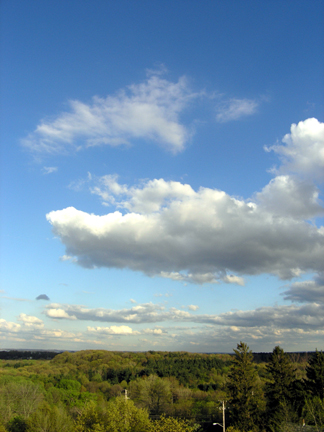
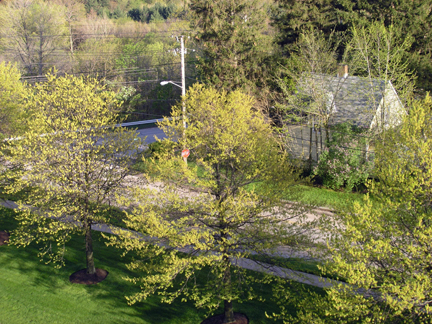
The weather forecast for mostly cloudy skies today was wrong. No complaint from me. (And the Green Report is looking up.)
I'm plenty proud of myself: not only did I finally buy the Olympus C-5060 Wide Zoom today, using a $200 gift certificate given to me upon my college graduation four years ago, but I actually haggled for a 256MB Lexar CompactFlash card and saved ten dollars. A man on one side of the counter goes home with a commission, a man on the other side with an industry-darling digital camera. After assembling and prepping the device, I've spent the past two hours switching back and forth between reading the manual and pressing buttons. Neither a wonk nor finicky, I'm overjoyed with the quality, ease-of-use and wealth of photographic decisions available to me. A few snapshots have been taken in the interests of working kinks out, one of them more interesting in its subject matter than its technical demonstration:
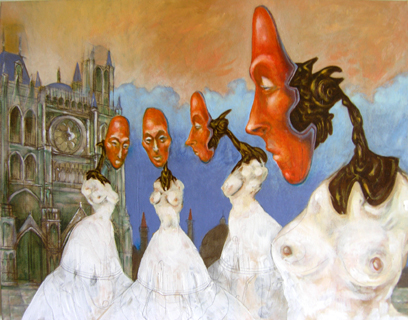
What do minarets; a mockup of Amiens Cathedral; and painted, armless women with masks stuck on tensile, metal necks have in common? An exercise in chasing away boredom with oil on canvas, painted in late 2000 and early 2001 — that's what.
I'll post more photographs as they, er, become available. And with a trip to Albany with the usual suspects in three or four weeks, many soon to come.
AFTER HOURS: Went to the ancestral home. Helped plant daylilies. Ate spaghetti. Watched Ghostbusters (and realized that "Library Administrator Roger Delacorte" is actor John Rothman, who played television executive "Warren Moburg" in 1998 miniseries From the Earth to the Moon; how's that for ident?).
Naturally, I brought the camera.
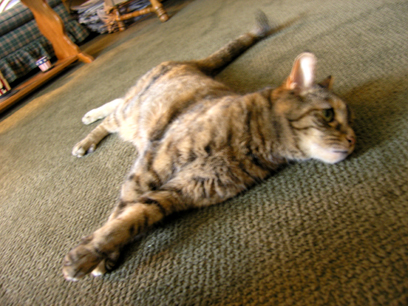
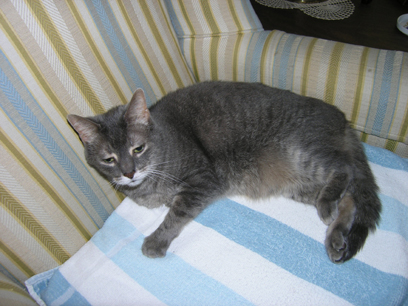
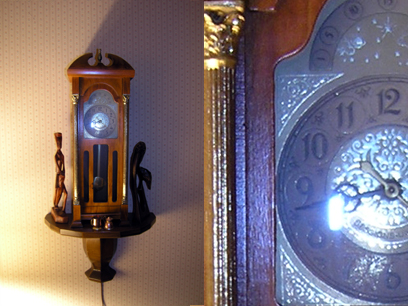
With partly cloudy skies, a fresh breeze and a muggy sixty degrees, it's spring in Northeast Ohio — and with spring comes the making of fresh lemonade. I squeeze the stuff from the designs of Plain Dealer Food Editor Joe Crea, who both identified and solved my minor culinary dilemma. Short and sweet, it is this: lemonade in the modern age has become a relative term, with little commercial distinction between highly processed counterfeits and powdered laboratory nightmares. I grew up on Kool-Aid brand drinks, which naturally included its Lemonade and Pink Lemonade. What came of one cup sugar, six cups water and the pouch was as close to lemonade as flavored antacid but for a child the taste was smooth, sweet and damn near citric enough. I loved it — even more so when I grew old enough to mix it myself and used the full cup of sugar my mother always (perhaps wisely) skimped on. This was a rare treat, and a product I stuck with for years. By contrast, Country Time lemonade and Crystal Light fail miserably in the bid to reproduce the taste of fresh fruit juice from sweetened granules. Lemony calcium deposits? Funny-tasting beverage? No thanks. If we're going there, I'll steer orange and drink Tang to support the Sixties spirit of NASA with daily Vitamin C all in one toss.
Frozen lemonade — from Minute Maid and the bunch — is better but usually far too tangy and a smidgen on the bitter side. A tall, cool drink for summer afternoons should not function as a stand-in decongestant. Bottled, lemonade tends towards the unappealing taste of preservatives. Restaurant lemonade is usually a bad situation; not too keen on dehydrating myself with soda if I don't need to, I'll opt for non-carbonated beverage. Wagering on the outside chance that the stock lemonade is passable, lemonade might be the order. More often than not, I regret it. Is there an industry standard requiring restaurant lemonade syrup to be among the most sour, biting, unpleasant non-toxic liquids to pour in a paper cup? USDA, where are you? Or is this your work? No, don't tell me. I'll stick to root beer.
Skip to the summer of 1998. My mother clipped Joe Crea's column from the paper. We read. We sympathized. We followed his directions. Masterful. I chilled the lemonade from the article entitled "Perfect Pitcher of Real Lemonade" for some auditioning later that evening. A college friend of my sister's, who was moving in town for his newly acquired job as assistant band director at the high school, stopped by our house for one reason or another.
"Would you like some lemonade?" I asked.
"Sure," he answered. I poured him a glass. He took a sip and his eyes bugged out before he started with "Wow! This is good." Split-second pause. "I mean, not that I thought it'd be bad, but —" he took a second draught, nodding slowly. "This is good." And it was good.
I cook like the Edge plays guitar: simple and effective. Lots of delay (ba-dum!). Whatever preparation time this recipe requires is offset by its ease. There are three elements to this lemonade: pitcher water, syrup and lemon juice.
1 1/2 cups granulated sugar
1/2 cup water (for syrup)
6 or 7 fat, juicy lemons
6 cups water (for pitcher)1. Set two lemons aside. Slice remaining lemons in half and juice. Collect 1 1/2 cups of lemon juice. Set aside.
2. Strip sequestered lemons with zester or knife, cutting thin slices of skin with as little of the white pith as possible. Set aside. Slice and juice lemons.
3. Pour 1 1/2 cups sugar and 1/2 cup of water into saucepan. Bring to boil on high burner heat; stir, cover, reduce heat and let simmer for no longer than five minutes.
4. Pour zest into sugar syrup and stir for three minutes. Remove from heat.
5. Pour lemon juice and 6 cups water into pitcher. Strain syrup into pitcher, using spoon to squeeze syrup from zest. Stir thoroughly and chill.
You'll like it; trust me. A couple of glasses of today's product have been my companions while typing. Sure to be many more glasses and pitchers. And just think: the whole summer's in front of us. Take it in style.
